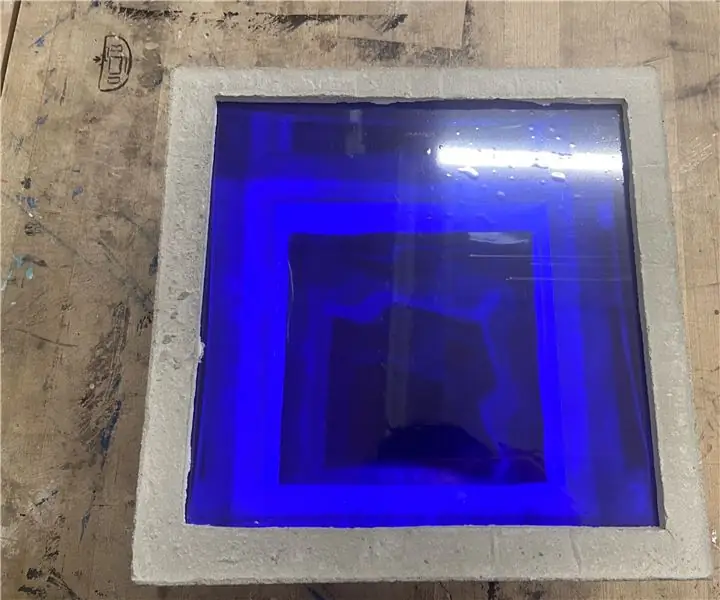
Sisällysluettelo:
- Kirjoittaja John Day day@howwhatproduce.com.
- Public 2024-01-30 09:01.
- Viimeksi muokattu 2025-01-23 14:41.
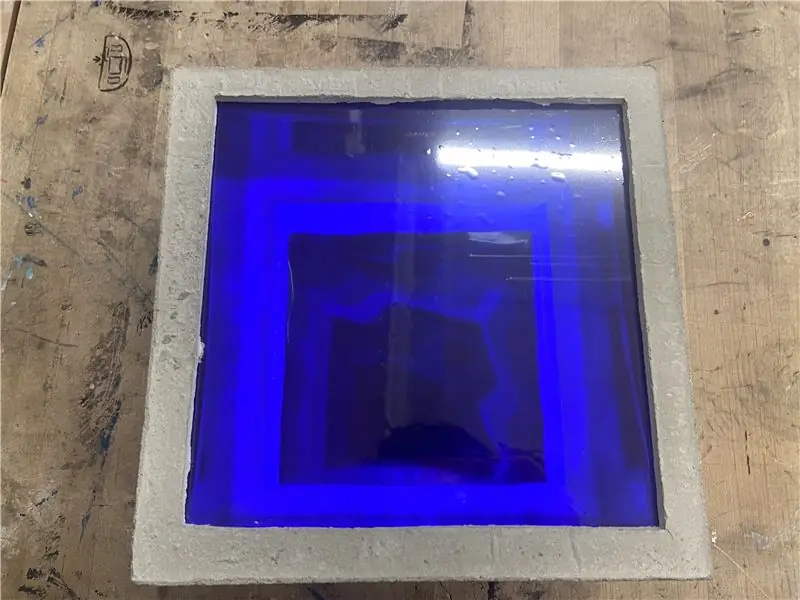
Tämä on LED -valolaitteen taideteos veistosprojektilleni nimeltä Sacred Object. Käytän tätä laitetta esitelläksesi uuteen maailmaan. Kun kytken LED -valon päälle, voimme nähdä ääretön tunnelin betonilaatikon sisällä. LED -nauhaa ohjataan puhelimeni bluetoothin kautta. Ostin kaikki tarvikkeet Amazonista.
Materiaalit:
- Arduino Uno
-LED-nauha
-9v akku
-DSD Tech SH-HC-08 Bluetooth 4.0 BLE-slave-moduuli
-330 ohmin vastus
- iPhone
-Betoni
-Akryyli
-Ikkunafilmi (yksisuuntainen peili)
-Kaksipuolinen peilikalvo
Vaihe 1: Piirin suunnittelu
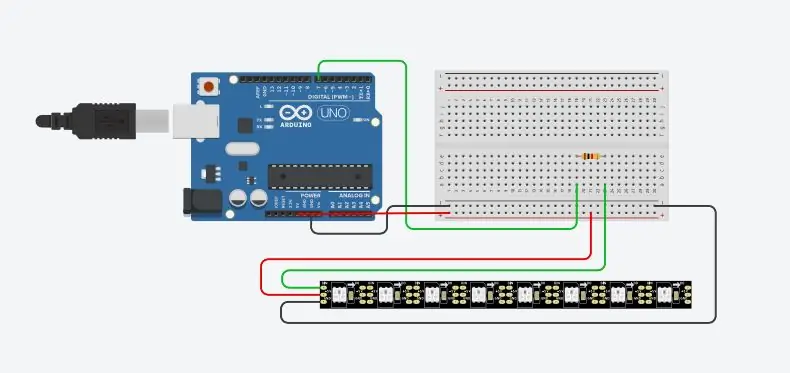

Näin saan piirin toimimaan. Tein myös sekvenssin aivojen aaltojen liikkeen simuloimiseksi.
Ensimmäinen kuva on LED -nauhapiiri.
Toinen kuva on Bluetooth -piiri. IPhonen sovellus on BluetoothLED.
Vaihe 2: Arduino -koodi
#sisältää
#define LED_PIN 7 #define NUM_LEDS 60 CRGB -lediä [NUM_LEDS];
void setup () {pinMode (LED_PIN, OUTPUT); Sarja.alku (9600); FastLED.addLeds (ledit, NUM_LEDS); }
void setBlue (int val) {for (int i = 0; i <NUM_LEDS; i ++) {leds = CRGB (0, 0, val); } FastLED.show (); } void loop () {
if (Serial.available ()) {val = Serial.read (); } if (val == 'H') {leds [0] = CRGB (0, 0, 0); FastLED.show (); ledit [1] = CRGB (0, 0, 0); FastLED.show (); ledit [2] = CRGB (0, 0, 0); FastLED.show (); ledit [3] = CRGB (0, 0, 0); FastLED.show (); ledit [4] = CRGB (0, 0, 0); FastLED.show ();
ledit [5] = CRGB (0, 0, 0); FastLED.show ();
ledit [6] = CRGB (0, 0, 0); FastLED.show ();
ledit [7] = CRGB (0, 0, 0); FastLED.show ();
ledit [8] = CRGB (0, 0, 0); FastLED.show ();
ledit [9] = CRGB (0, 0, 0); FastLED.show ();
ledit [10] = CRGB (0, 0, 0); FastLED.show ();
ledit [11] = CRGB (0, 0, 0); FastLED.show ();
ledit [12] = CRGB (0, 0, 0); FastLED.show ();
ledit [13] = CRGB (0, 0, 0); FastLED.show ();
ledit [14] = CRGB (0, 0, 0); FastLED.show ();
ledit [15] = CRGB (0, 0, 0); FastLED.show ();
ledit [16] = CRGB (0, 0, 0); FastLED.show ();
ledit [17] = CRGB (0, 0, 0); FastLED.show ();
ledit [18] = CRGB (0, 0, 0); FastLED.show ();
ledit [19] = CRGB (0, 0, 0); FastLED.show ();
ledit [20] = CRGB (0, 0, 0); FastLED.show ();
ledit [21] = CRGB (0, 0, 0); FastLED.show ();
ledit [22] = CRGB (0, 0, 0); FastLED.show ();
ledit [23] = CRGB (0, 0, 0); FastLED.show (); ledit [24] = CRGB (0, 0, 0); FastLED.show ();
ledit [25] = CRGB (0, 0, 0); FastLED.show ();
ledit [26] = CRGB (0, 0, 0); FastLED.show ();
ledit [27] = CRGB (0, 0, 0); FastLED.show ();
ledit [28] = CRGB (0, 0, 0); FastLED.show ();
ledit [29] = CRGB (0, 0, 0); FastLED.show ();
ledit [30] = CRGB (0, 0, 0); FastLED.show (); ledit [31] = CRGB (0, 0, 0); FastLED.show ();
ledit [32] = CRGB (0, 0, 0); FastLED.show ();
ledit [33] = CRGB (0, 0, 0); FastLED.show (); ledit [34] = CRGB (0, 0, 0); FastLED.show ();
ledit [35] = CRGB (0, 0, 0); FastLED.show ();
ledit [36] = CRGB (0, 0, 0); FastLED.show ();
ledit [37] = CRGB (0, 0, 0); FastLED.show ();
ledit [38] = CRGB (0, 0, 0); FastLED.show ();
ledit [39] = CRGB (0, 0, 0); FastLED.show ();
ledit [40] = CRGB (0, 0, 0); FastLED.show ();
ledit [41] = CRGB (0, 0, 0); FastLED.show ();
ledit [42] = CRGB (0, 0, 0); FastLED.show ();
ledit [43] = CRGB (0, 0, 0); FastLED.show (); ledit [44] = CRGB (0, 0, 0); FastLED.show ();
ledit [45] = CRGB (0, 0, 0); FastLED.show ();
ledit [46] = CRGB (0, 0, 0); FastLED.show ();
ledit [47] = CRGB (0, 0, 0); FastLED.show ();
ledit [48] = CRGB (0, 0, 0); FastLED.show ();
ledit [49] = CRGB (0, 0, 0); FastLED.show ();
ledit [50] = CRGB (0, 0, 0); FastLED.show ();
ledit [51] = CRGB (0, 0, 0); FastLED.show ();
ledit [52] = CRGB (0, 0, 0); FastLED.show ();
ledit [53] = CRGB (0, 0, 0); FastLED.show (); ledit [54] = CRGB (0, 0, 0); FastLED.show ();
ledit [55] = CRGB (0, 0, 0); FastLED.show ();
ledit [56] = CRGB (0, 0, 0); FastLED.show ();
ledit [57] = CRGB (0, 0, 0); FastLED.show ();
ledit [58] = CRGB (0, 0, 0); FastLED.show ();
ledit [59] = CRGB (0, 0, 0); FastLED.show ();
viive (100); } else {for (int i = 255; i> 0; i--) {setBlue (i); viive (10); } for (int i = 0; i <255; i ++) {setBlue (i); viive (10); }}}
Vaihe 3: Säiliön valmistus
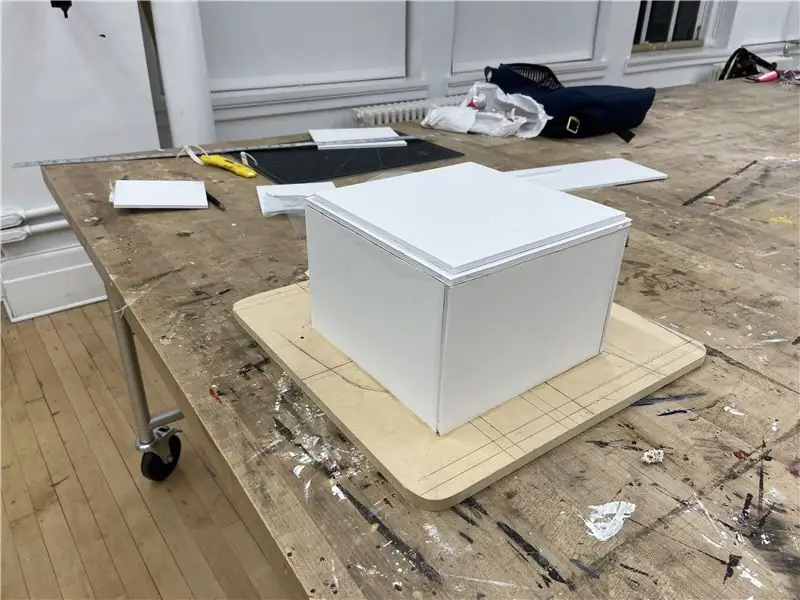
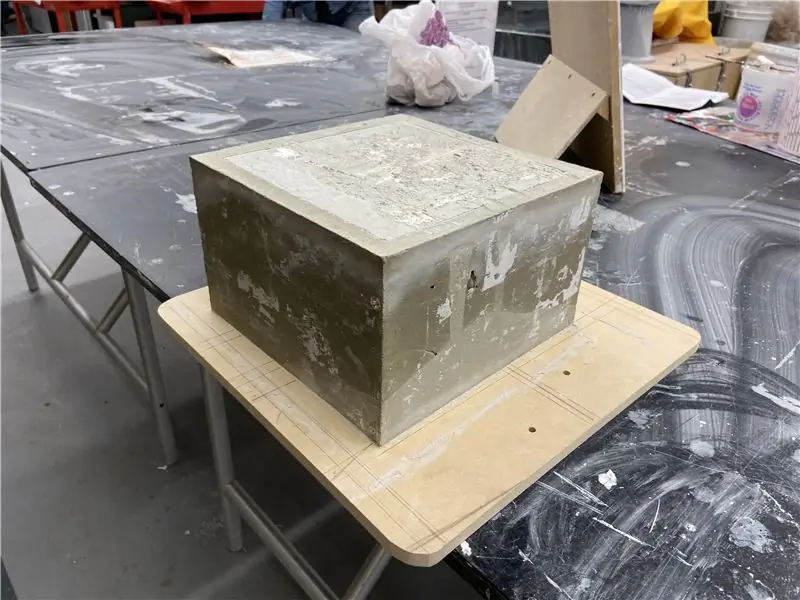
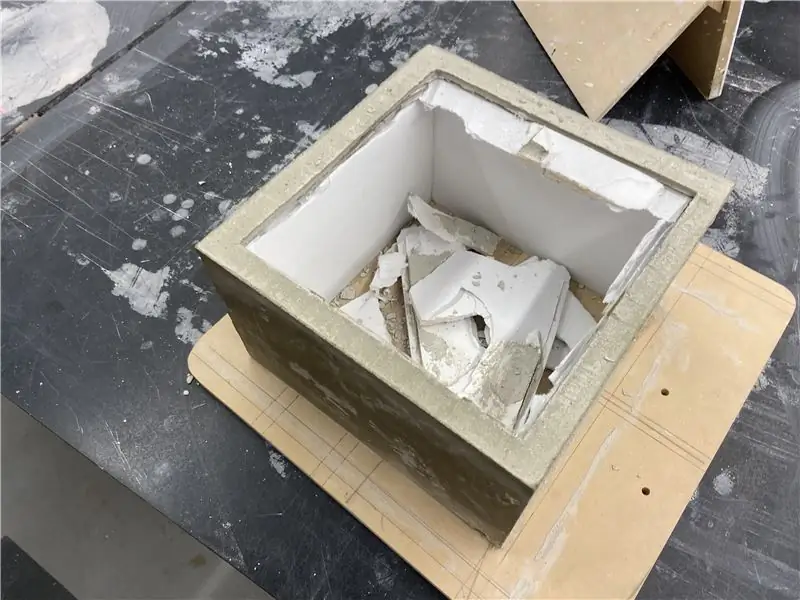
Laatikko on betonia. Käytän vaahtolevyjä onton laatikon valmistamiseen betonilla. Anna sen kuivua vähintään 24 tuntia.
Vaihe 4: Laserleikkaus
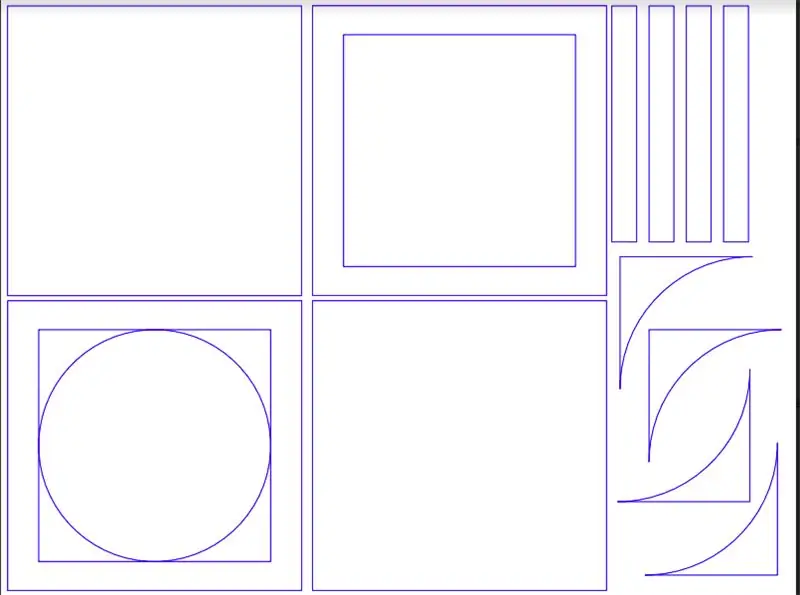
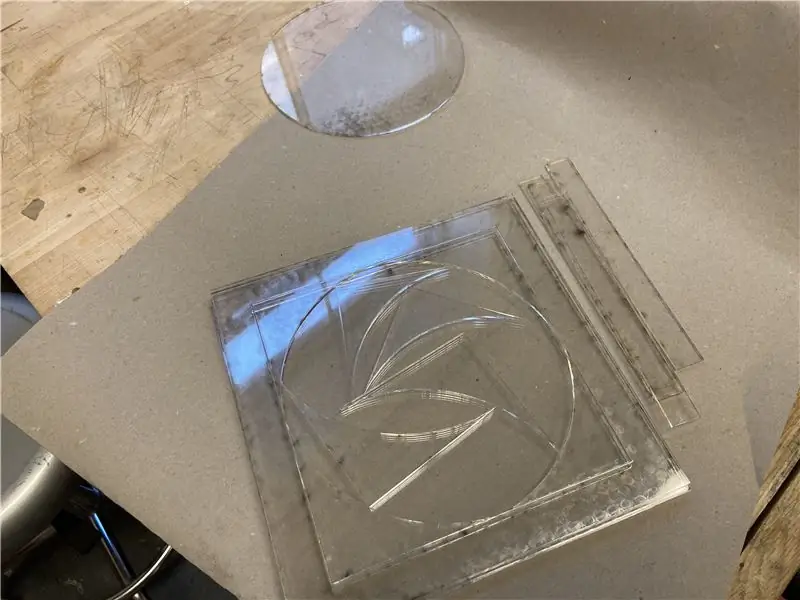
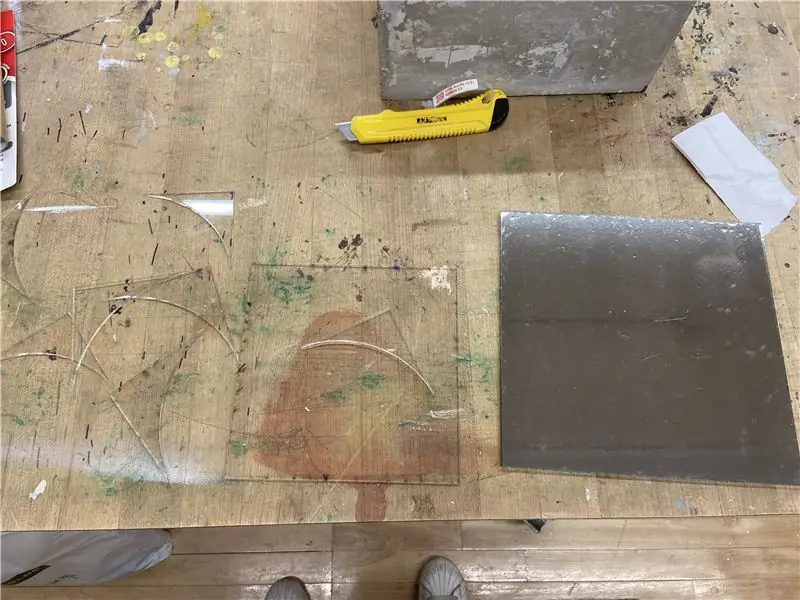
Muotojen piirtäminen sopii betonilaatikkoon ja leikataan laserleikkauksella.
Käytän tätä kerrostamaan eri tilaa laatikon sisällä: heijastustilaa ja piiritilaa. Laitoin yksisuuntaisen peiliikkunakalvon ja kaksipuolisen peilikalvon jokaiseen akryyliruutuun.
Vaihe 5: LED -nauha
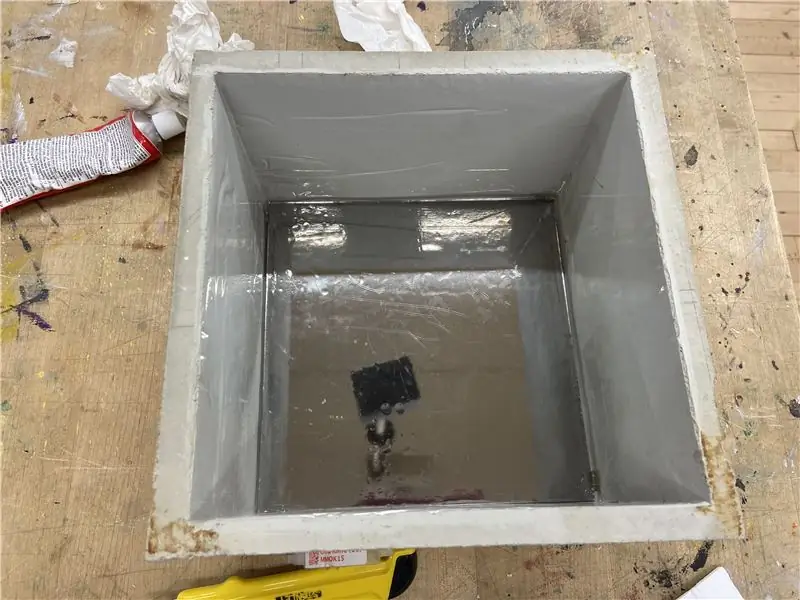
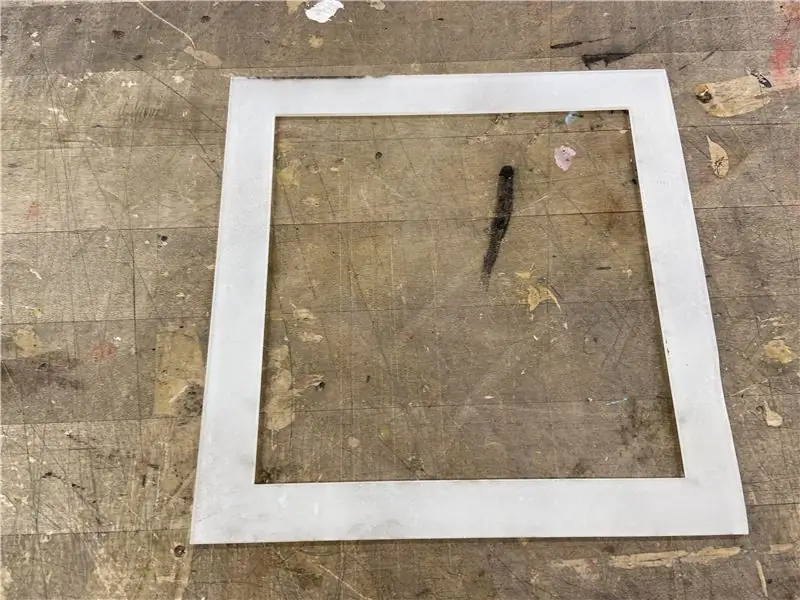
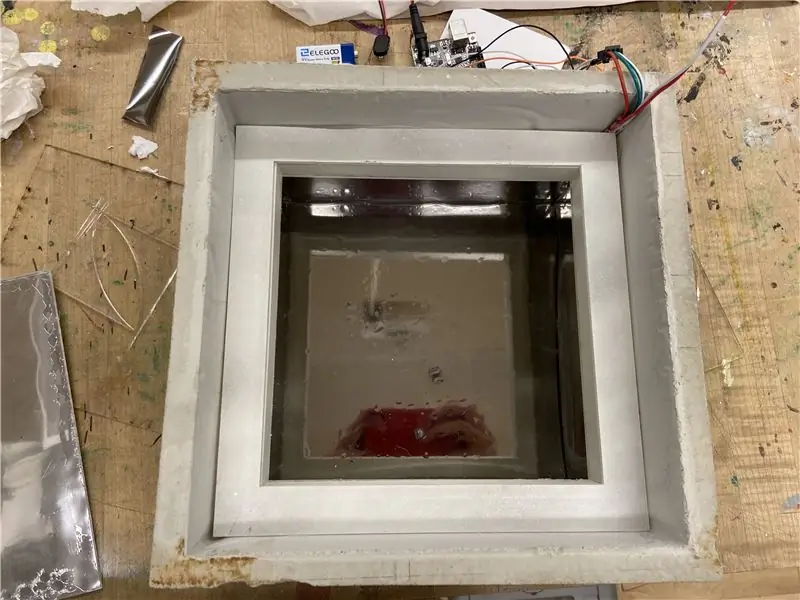
(Näkymä laatikon pohjasta)
Laitoin yksisuuntaisen peilikalvon ensin, peilin sivut laatikon sisäpuolelle. Ja suihkuta valkoista väriä kehykseen luodaksesi puoliläpinäkyvän putken LED-nauhalle ja aseta se laatikon keskelle.
Vaihe 6: Piiri
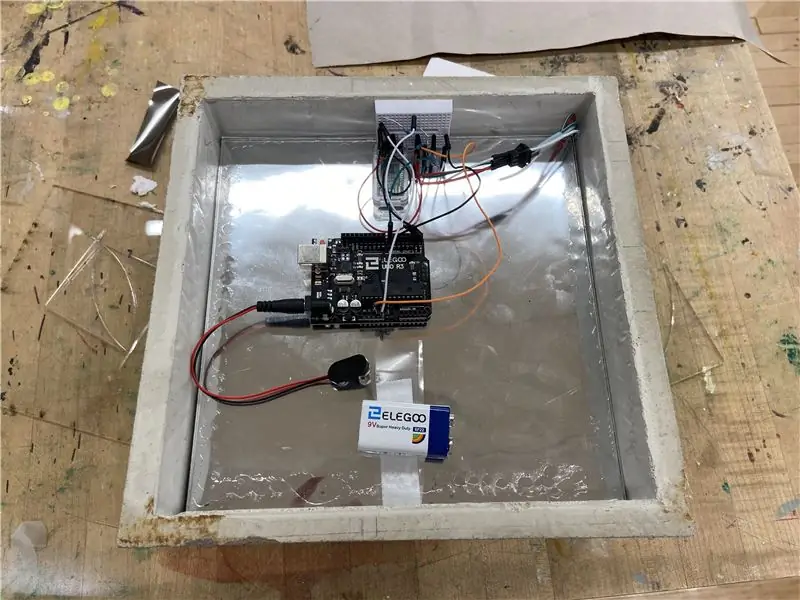
Aseta kaksipuolinen peili akryyli LED -valon päälle ja kiinnitä piiri.
Suositeltava:
Hajautettu LED -nauhakyltti Arduinolla/Bluetoothilla: 8 vaihetta (kuvilla)
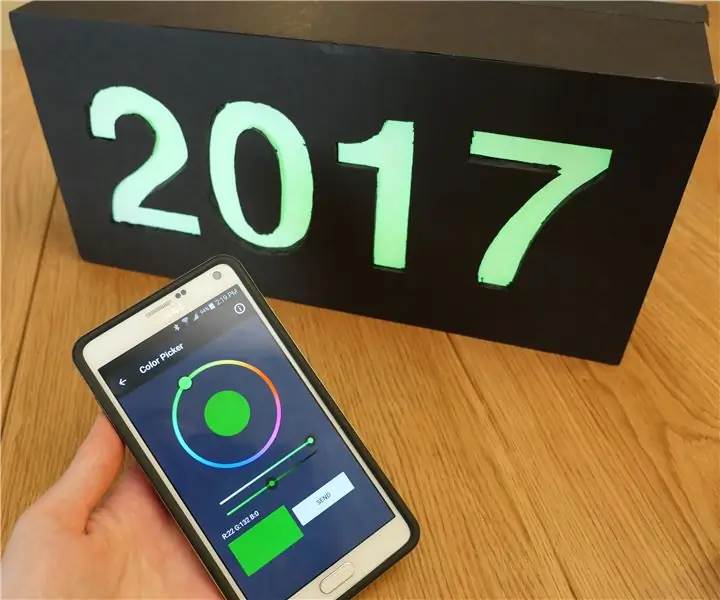
Hajaantunut LED -nauhakyltti Arduinolla/Bluetoothilla: loin tämän merkin DJ -osastolle 8. vuosittaisessa vuorovaikutteisessa näyttelyssä paikallisessa hakkeritilassani, NYC Resistorissa. Tänä vuonna teemana oli Running Man, vuoden 1987 scifi-elokuva, joka sijoittuu vuonna 2017. Merkki on rakennettu vaahtomuovista
Biometrinen sisäänpääsy autoon - todellinen avaimeton auto: 4 vaihetta
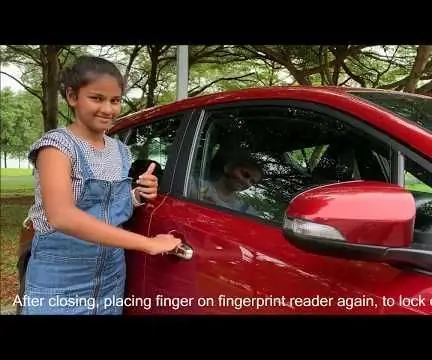
Biometrinen sisäänpääsy autoon - todellinen avaimeton auto: Muutama kuukausi sitten tyttäreni kysyi minulta, miksi nykyaikaisissa autoissa ei ole biometristä syöttöjärjestelmää, vaikka jopa matkapuhelimessa on se. Siitä lähtien on työskennellyt saman toteuttamiseksi ja lopulta onnistuin asentamaan ja testaamaan jotain laitteelleni
Lähetä numeerisia tietoja yhdestä Arduinosta toiseen: 16 vaihetta
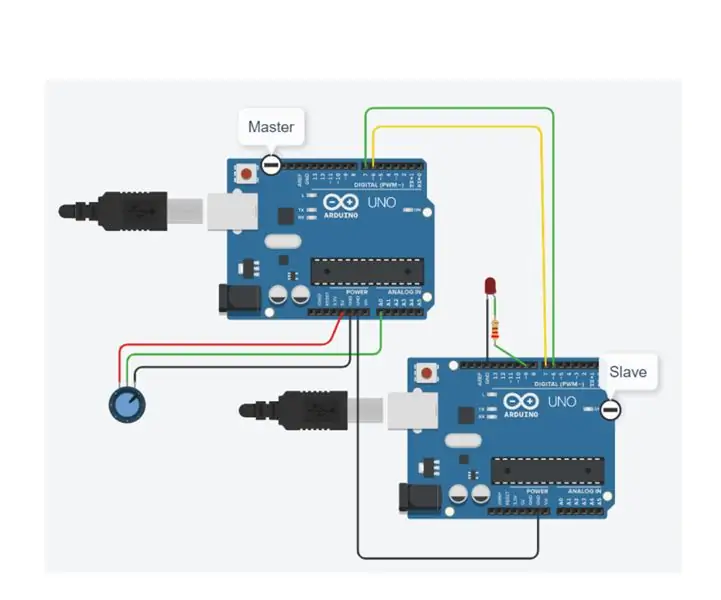
Lähetä numeerisia tietoja Arduinosta toiseen: Johdanto David Palmer, CDIO Tech. Pitäisikö sinun koskaan lähettää joitakin numeroita Arduinon poikki toiselta? Tämä opas näyttää kuinka. Voit helposti testata sen toimivuuden yksinkertaisesti kirjoittamalla numerojonon, joka lähetetään S
Työpöytäjärjestäjä LED -matriisikellolla ja Bluetoothilla: 7 vaihetta
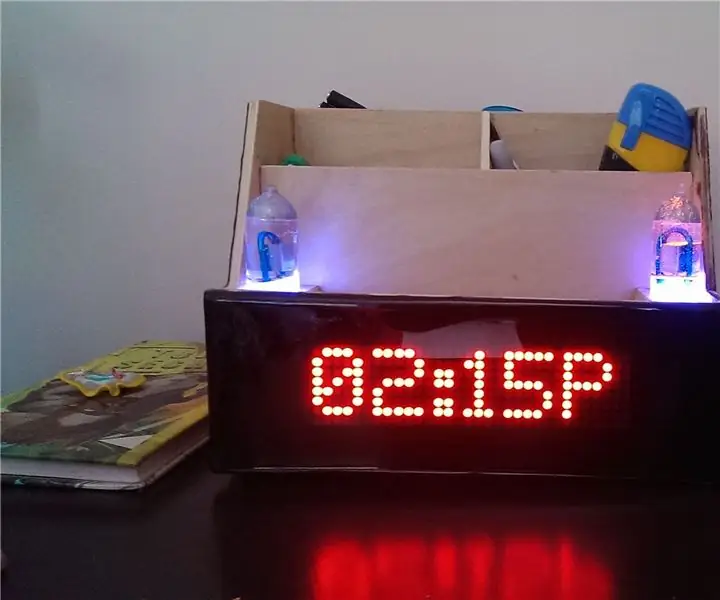
Työpöydän järjestäjä LED -matriisikellolla ja Bluetoothilla: Työpöytäni oli hyvin sekava ja halusin saada mukavan järjestäjän, jossa voisin järjestää lyijykynäni, siveltimet, savityökalut jne. Katsoin monia järjestäjiä markkinoilla, mutta en pitänyt niistä . Aloin suunnitella oman työpöytäjärjestäjäni ja täällä
HeadBot-itsetasapainottava robotti STEM-oppimiseen ja ulottuvuuteen: 7 vaihetta (kuvilla)
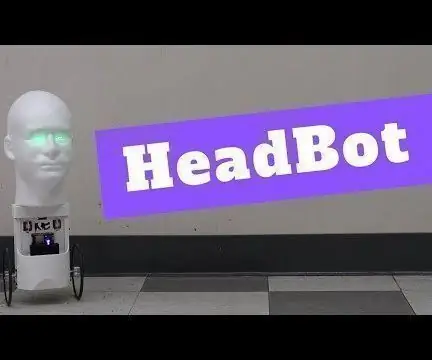
HeadBot-itsetasapainottava robotti STEM-oppimiseen ja ulottuvuuteen: Headbot-kahden jalan korkea, itsetasapainottava robotti-on South Eugene Robotics Teamin (SERT, FRC 2521), ensimäisen kilpailukykyisen lukion robotiikkaryhmän, aivopohja. Robotikilpailu, Eugene, Oregon. Tämä suosittu avustusrobotti tekee
